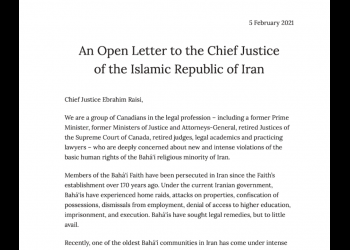Former Canadian Prime Minister and high-ranking legal professionals call on Iranian Chief Justice, Ebrahim Raisi, to stop persecution of Baha’is in Iran
Persian translation.
The former Canadian Prime Minister Brian Mulroney is among a group of more than 50 high-ranking legal professionals, including former Supreme Court of Canada judges, Canadian justice ministers, prominent legal academics and practicing lawyers, who have written an open letter to the Islamic Republic of Iran’s Chief Justice, Ebrahim Raisi. The letter expresses deep concern regarding “new and intense violations” of the human rights of the country’s Baha’i community. It specifically condemns a recent court ruling to confiscate Baha’i properties in Ivel, a village in northern Iran.
“Members of the Baha’i Faith have been persecuted in Iran since the Faith’s establishment over 170 years ago,” the letter states. “Under the current Iranian government, Baha’is have experienced home raids, attacks on properties, confiscation of possessions, dismissals from employment, denial of access to higher education, imprisonment, and execution. Baha’is have sought legal remedies, but to little avail.”
The unprecedented outpouring of support comes after Baha’i-owned properties have been unjustly confiscated by Iranian authorities in Ivel. The confiscations, which have occurred solely on religious grounds, have left dozens of families internally displaced and economically impoverished.
Article 49 of the Iranian Constitution—which was used by Iranian courts to justify the seizures in a final ruling in October 2020—requires the government to prove the legitimacy of such seizures under Islamic law. Despite this requirement, however, numerous official documents unmistakably reveal religious prejudice as the sole motive behind the confiscations. Some records show, for instance, that Baha’is were told that if they converted to Islam, then their properties would be returned.
“The 2020 rulings now establish a dangerous constitutional precedent of judicially sanctioned confiscation that nullifies legitimate property interests based only on the owners’ religious affiliation, thus departing not only from international human rights standards but also from the text and intent of the Iranian constitution itself”, the letter to Chief Justice Raisi states.
Religious discrimination against the Baha’i community, it further states, “can provide solid grounds for prosecution of Iran’s authorities before international criminal courts and other international institutions.”
Despite repeated attempts by the Baha’is in Ivel to appeal for their rights, their lawyers were given no opportunity to see court documents to prepare a defense or to present any arguments.
The situation in Ivel is an “alarming new chapter” in the persecution, the letter says, noting that Ivel’s Baha’i community, which dates to the mid-1800s, was once a “thriving and peaceful multi-generational community…of farmers and small business owners”. But since the 1979 Islamic Revolution, Baha’is in Ivel have been “forced from their homes, imprisoned, harassed, and their property torched and demolished.”
“This letter from prominent legal figures demonstrates that the cruel treatment meted out to the Baha’is by the Iranian authorities has not gone unnoticed by the international community”, says Diane Ala’i, Representative of the Baha’i International Community to the United Nations in Geneva. “It has, instead, served to galvanize public conscience around the world.”
“We know the Baha’i Faith to stand for values of peace, justice, and unity—values which have been under sustained attack by the Iranian authorities for decades” the letter states, in its concluding remarks. “Today, as members of the Canadian legal profession who believe in the rule of law, we too stand with the Baha’is of Iran and call upon you, as the head of the Iranian judiciary, to address this new abuse inflicted upon the Baha’is of Ivel.”
Background
-
The Baha’is are Iran’s largest non-Muslim religious minority and have been the target of 42 years of state-sanctioned systematic persecution—documented extensively by the United Nations.
-
Confiscation of Baha’i properties—holy places as well as individual properties—has been part of Iran’s systematic campaign of economic, cultural and social persecution against the Baha’is. It has been part of a four-decades long effort to destroy the Baha’i community as a viable entity in the country.
-
The confiscations in Ivel, affecting 27 Baha’is, were issued on August 1, 2020 by Judge Hasan Babaie, and affirmed in an appeal court on October 13, 2020, by Judge Mohammad Sadegh Savadkouhi.
-
In 2010, homes belonging to some 50 Baha’is in Ivel were burned and demolished, driving them away from their ancestral farms and homes.
-
The Baha’is in Ivel have resided in the village for over a century and a half—since shortly after the establishment of the Baha’i Faith—living side by side with their Muslim neighbours in relative harmony and contributing greatly to the social progress of the village. The Baha’is also helped to establish schools, health institutions, and played an important role in strengthening the area’s agriculture.
-
Baha’is have previously also been denied access to the health clinics and other institutions they had helped to establish in Ivel. Teachers have found various means to persecute Baha’i pupils, including by failing them in their exams; the hundred-year old Baha'i cemetery in the village was confiscated and sold for conversion into residential property; and in 1983, more than 130 Baha’is were locked in a local mosque, held captive for three days without food and water, and told to recant their faith.
-
Baha’is in Iran are barred from government jobs and universities as per Iranian policy, their shops are closed and sealed regularly, they are arrested, imprisoned and released on large bail amounts, and in recent times a wave of property confiscation and targeting of Baha’i assets and properties is threatening their livelihoods. In an open letter to President Rouhani in 2016, the Baha’i International Community called it an “economic apartheid” against the Baha’is as a segment of Iran’s population.
-
More recently, in November 2020, despite a national lockdown owing to the pandemic, over a hundred government agents raided the shops and homes of dozens of Baha’is in seven cities to demand that they hand over their property deeds.
